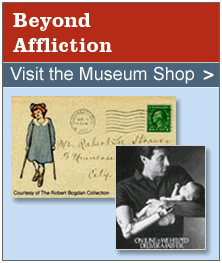About: Academic Advisors
Academic Advisors
The staff of the Disability History Museum works closely with the following Advisors to identify goals, methods, and content.
Dr. Douglas Baynton
Departments of History and of Communication Sciences and Disorders, University of Iowa. Baynton's primary interest is the history of disability in the United States. His research and teaching explore how the cultural meanings of disabilities have changed over time. He is the author of "Forbidden Signs: American Culture and the Campaign against Sign Language (1996), among other works, and is a key member of the Disability History Association.
Dr. Felicia Kornbluh
Associate Professor of History, Univeristy of Vermont. Kornbluh's book, "The Battle for Welfare Rights", (2007), is a study of the social movement for welfare rights, and its interactions with mainstream political and legal institutions, in New York City and nationally. She is now writing a monograph on the New York City World's Fair of 1964-1965, and is also in the middle of a long-term project on disability, gender and social welfare, which focuses on the activist and constitutional law scholar Jacobus tenBroek. She's received fellowships from the Woodrow Wilson Foundation, the American Historical Association, and many other sources. In addition to her career as a scholar, she has a long career as an advocate and activist, especially on issues of women's and children's well-being.
Dr. Laura Lovett
Department of History, University of Massachusetts Amherst, and Director of the Five College Women's Studies Research Center, South Hadley. Lovett's research interests concern gender, race and the family in twentieth century America. She published Conceiving the Future: Pronatalism, Reproduction and the Family in the United States, 1890-1930, with the University of North Carolina Press in 2007.
Dr. Marty Pernick
Professor of History and Associate Director, Program in Society and Medicine , University of Michigan. Pernick studies the history of medicine, specializing in the role of value issues in medicine, and the links between medicine and mass culture. He is best known for his work, The Black Stork: Eugenics and the Death of "Defective" Babies in American Medicine and Motion Pictures since 1915 (New York: Oxford University Press, 1996, 1999
Dr. Benjamin Reiss
Department of English, Emory University specializes in 19th-century American literature and culture, with strong interests in popular culture, medicine, race, disability, and environmental issues. He is the author of Theaters of Madness: Insane Asylums and Nineteenth-Century American Culture (University of Chicago Press, 2008)
Dr. Richard Scotch
Professor of Sociology, Public Policy, and Political Economy at the University of Texas at Dallas, where he coordinates the programs in Sociology and Evaluation Research, University of Texas, Dallas. Dr. Scotch is the author of two books and numerous articles and monographs on social policy reform and social movements in disability, health care, education, and human services. A past president of the Society for Disability Studies,Scotch is the author of two books and numerous articles and monographs on social policy reform and social movements in disability, health care, education, and human services.
Dr. James Trent
Trent is a retired professor of Sociology and Social Work at Gordon College and specializes in the history of marginalized and disenfranchised groups in the United States. He is the author of Inventing the Feeble Mind: A History of Mental Retardation in the United States which won the Hervey B. Wilbur Award from the American Association on Intellectual and Developmental Disabilities in 1995.
Past Advisors
The staff remains deeply grateful to these individuals for their contributions:
Dr. Peter Dobkin Hall
Hall teaches in the School of Public Affairs at Baruch College, City Univerisity of New York. He is also a Senior Research Fellow at the Hauser Center for Nonprofit Organizations, Harvard University. Hall has had a long association with the DHM. He writes and teaches on the development of nonprofit institutions, religion, philanthropic elites, higher education, charities law, corporate social responsibility, and public policy
Dr. Paul Longmore
In memoriam: Since 1996, Paul Longmore provided cogent advice and encouragement to the DHM. Professor of History and founding director of the Institute on Disability at San Francisco State University, he was a pioneer in the field of disability history and a leading disability rights advocate. Paul Longmore inspired us and challenged us – we miss him dearly.
Thomas Thurston
Education Director, The Gilder Lehrman Center for the study of slavery, resistance and abolition, Yale University. He previously served as the Project Director of the New Deal Network, an educational website developed by the Franklin and Eleanor Roosevelt Institute and the Institute for Learning Technologies at Teachers College, Columbia University.
-
* Dr. Patricia Deegan, Director of Ex-Patient Studies at the Boston University Institute for the Study of Human Resilience -
* Dr. Karen Hirsch, Program Director, IMPACT, Inc., Center for Independent Living, Alton, IL -
* Mark Johnson, Coordinator of Advocacy and Community Support, Shepherd Center, Atlanta, GA -
* Mary Johnson, Editor, The Ragged Edge, Louisville, KY -
* Dr. Eva Kittay, SUNY Stonybrook, New York -
* John D. Kemp, Principal, Powers Pyles Sutter & Verville PC, Washington, DC -
* Anthony Tusler, Anthony Tusler Consulting






